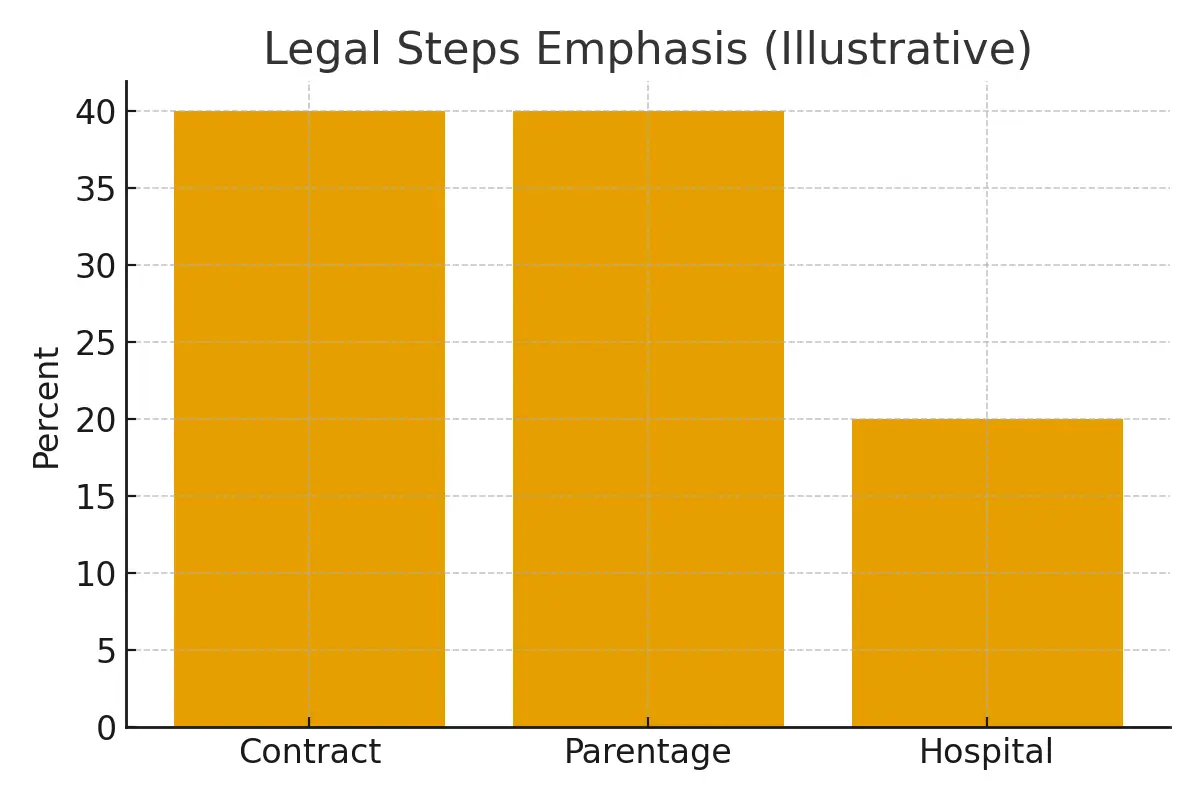
For LGBTQ+ parents-to-be, medical treatment is only part of the family-building journey. Legal preparation—especially around hospital procedures and birth certificates—is just as important. These steps influence outcomes, timelines, and budgets, while also ensuring your parental rights are fully protected. By preparing early, you can reduce uncertainty and move forward with confidence.
What It Is
Legal preparation for hospitals and birth certificates means ensuring that both intended parents are recognized in the eyes of the law at the time of birth. It includes:
- Drafting documents that confirm your parental rights.
- Coordinating with the hospital on birth certificate procedures.
- Filing legal paperwork (such as parentage orders or second-parent adoption, depending on your state or country).
These steps may feel bureaucratic, but they are critical for securing your family’s future and avoiding legal disputes later on.
Who It Helps
This preparation is essential for:
- Same-sex couples where only one partner is giving birth.
- Couples using donor eggs, sperm, or embryos.
- Families working with gestational carriers or surrogates.
- Parents living in states or countries with uneven recognition of LGBTQ+ rights.
Even when hospitals appear supportive, relying only on verbal assurances or a birth certificate can leave gaps in legal recognition. Formal legal preparation ensures long-term protection.
Step-by-Step
Here’s a simple sequence that minimizes stress and protects your parental rights:
- Choose your legal team early – preferably before pregnancy or during the first trimester.
- Review hospital policies – understand what paperwork is needed at delivery.
- File pre-birth parentage orders (if available) – ensures both parents are recognized immediately at birth.
- Prepare supporting documents – powers of attorney, donor agreements, or surrogacy contracts.
- Follow up after birth – confirm both names appear correctly on the birth certificate.
This timeline reduces surprises and avoids rushed decisions during or after delivery.
Pros & Cons
Pros:
- Both parents have full legal recognition from the start.
- Reduced risk of custody or guardianship disputes.
- Birth certificate accuracy across state and international borders.
- Peace of mind during delivery and beyond.
Cons:
- Legal preparation adds cost to the family-building process.
- Requirements vary by state, which can cause delays.
- Court hearings may feel stressful or invasive.
Costs & Logistics
Legal preparation comes with predictable costs, but planning helps manage them:
- Attorney fees: typically $2,000–$5,000 depending on complexity.
- Court filing fees: vary by state.
- Document preparation: contracts, affidavits, and parental rights filings.
- Cash flow planning: combine legal timelines with medical payments to avoid financial crunches.
Insurance generally does not cover legal costs, so out-of-pocket planning is key.
What Improves Outcomes
Certain actions significantly reduce stress and risk:
- Start legal prep early—waiting until after delivery can complicate matters.
- Coordinate between clinic, attorney, and hospital to avoid miscommunication.
- Use checklists for documents and deadlines to prevent overlooked steps.
- Confirm hospital staff are aware of your plan before admission.
- Include mental health support to help manage stress during legal and medical steps.
Case Study
A same-sex couple prepared for birth without early legal planning. At the hospital, they were told only the birthing parent could be listed on the initial certificate. This caused confusion and distress. After consulting an experienced attorney, they secured a parentage order—but it delayed recognition for months. In contrast, couples who complete legal prep before delivery often walk into the hospital with paperwork ready, ensuring a smooth and affirming experience.
Mistakes to Avoid
- Waiting until delivery to think about legal steps.
- Assuming a birth certificate is always enough for recognition.
- Ignoring differences between states or countries.
- Not budgeting for legal costs alongside medical ones.
- Overlooking communication with hospital staff before labor.
FAQs
Q. Do both LGBTQ+ parents automatically go on the birth certificate?
Ans : Not always. In many states, only the birthing parent is recognized unless additional legal steps are taken.
Q. Is a birth certificate the same as a parentage order?
Ans : No. A birth certificate is an administrative document, while a parentage order is a court ruling that ensures parental rights are legally enforceable everywhere.
Q. When should we start legal preparation?
Ans : Ideally before pregnancy or in the first trimester. Waiting too long can limit your options.
Q. How much does legal preparation cost?
Ans : Most families spend between $2,000 and $5,000, depending on state laws and whether additional filings (like adoption) are required.
Q. What if we give birth in one state but live in another?
Ans : It’s crucial to check recognition laws in both places. Some states accept out-of-state parentage orders easily, while others require additional filings.
Call to Action
- Free 15-min nurse consult
- Upload labs for review
- Personalized cost breakdown for your case
Related Links

Dr. Kulsoom Baloch
Dr. Kulsoom Baloch is a dedicated donor coordinator at Egg Donors, leveraging her extensive background in medicine and public health. She holds an MBBS from Ziauddin University, Pakistan, and an MPH from Hofstra University, New York. With three years of clinical experience at prominent hospitals in Karachi, Pakistan, Dr. Baloch has honed her skills in patient care and medical research.





